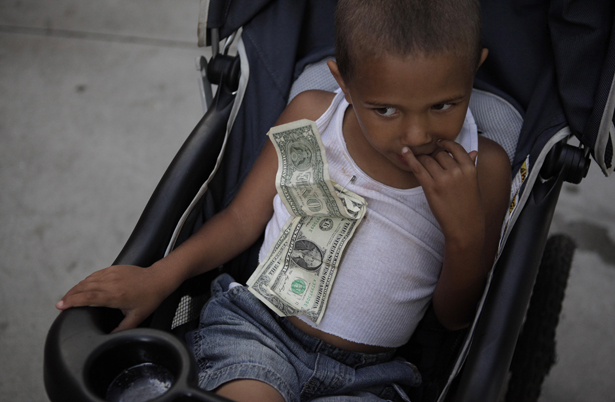
4-year-old Nathan Hobbs, who lives in a homeless shelter with his mother, sits in a stroller with one dollar bills he received for his birthday pinned to his chest in Los Angeles. (AP Photo/Jae C. Hong)
This story originally appeared at Truthdig. Robert Scheer is the author of The Great American Stickup: How Reagan Republicans and Clinton Democrats Enriched Wall Street While Mugging Main Street (Nation Books).
Who will speak for the rights of the unborn now that Rick Santorum is gone from the race? Let me give it a whirl from the perspective of one whose own unwed mother had several abortions before yours truly was permitted to emerge.
My arrival came during the US economy’s previous great crash, back in 1936. My father, who was already supporting an earlier family with two teenage children, had every intention of providing well for me, but he was laid off that very day and informed my mother of the unhappy fact within moments of setting eyes on me in a Bronx hospital. My father held on to part-time jobs in garment industry sweatshops (where my mother, too, worked), but it would be four years before he had a full-time paycheck again. He stood by both families during that dark period, seizing every opportunity to work, mostly in government-sponsored employment. And yes, we lived in part on government welfare—or home relief, as it was then called. All of which made President Franklin Delano Roosevelt, and the New Deal he fashioned to save tens of millions of impoverished folks just like us throughout the country, objects of veneration.
So why am I bringing all this ancient history up now? Because I was dumbfounded by a headline Saturday in the New York Times that reminded me of how far we have gone wrong: “Welfare Limits Left Poor Adrift as Recession Hit.” And by “we” I mean not only the heartless Republicans who love the fetus and then shun the child but also the “progressives” who dare not use the word “liberal” because concern for the poor conflicts with the opportunism that defines their politics.
The death of American liberalism as a significant moral force can be traced to the point in 1996 when President Bill Clinton signed legislation that effectively ended the main federal anti-poverty program and turned the fate of welfare recipients, 70 percent of whom were children, over to the tender mercies of the states. With a stroke of the pen, Clinton eliminated what remained of New Deal-era compassion for the poor and codified into law the “tough love” callousness that his Republican allies in the Congress, led by Newt Gingrich, had long embraced.
The ensuing wave of state-imposed eligibility restrictions was designed to replace the war on poverty with a war on welfare recipients, with the result that in this time of economic crisis the poor have nowhere to turn. It also allowed states to play in a meanness derby, cutting the welfare rolls and forcing many of the desperate to cross state lines to locales where they might survive. “My take on it was the states would push people off [the assistance lists] and not let them back on, and that’s just what they did,” said Peter B. Edelman, who resigned from the Clinton administration over this issue and who told the Times for the recent article, “It’s been even worse than I thought it would be.”
Edelman, now a law professor at Georgetown University, was a close friend of the Clintons. His principled resignation was a rare exception to the cheerleading by Democrats who celebrated President Clinton’s betrayal of the poor as shrewd triangulation. Clinton himself had to be fully aware of the depth of that betrayal because he had governed one of the poorest states. In an interview I did with him for the Los Angeles Times when he was still the governor of Arkansas, he was very clear on two points concerning socially responsible welfare reform: It required federal standards, and it would cost more money because the well-being of children was at stake. “To do it, you need more money … for education, training, transportation, and child care.”
Calling the shots on spending for the most vulnerable since the Clinton revisions went into effect, the states have diverted funds for the poor to filling other holes in state budgets. Consequently, as the New York Times piece noted last week, “Just one in five poor children now receive cash aid, the lowest level in nearly 50 years.”
The response of the right-to-life Republicans has been typical—indifference to the fate of the fetus once it’s born. Paul Ryan, House budget leader and rumored to be Mitt Romney’s pick for vice president, judges the current welfare program “an unprecedented success,” and Romney himself wants to extend the welfare-cut model to “all these federal programs,” including Medicaid and food stamps.
During his campaign, Santorum, who on Tuesday dropped out as the standard-bearer for pro-life family values, turned to Clinton’s draconian welfare law as a source of deep spiritual guidance: “It didn’t just cut the rolls, but it saved lives” and granted the poor “something dependency doesn’t give: hope.”
Well, glory be, hope is on the rise. A recent and well-documented Indiana University study concludes that the number of Americans living beneath the poverty line has risen 27 percent during the recession, leaving 46 million former fetuses living large on a new hope diet.
Robert Scheer is the author of The Great American Stickup: How Reagan Republicans and Clinton Democrats Enriched Wall Street While Mugging Main Street (Nation Books).


